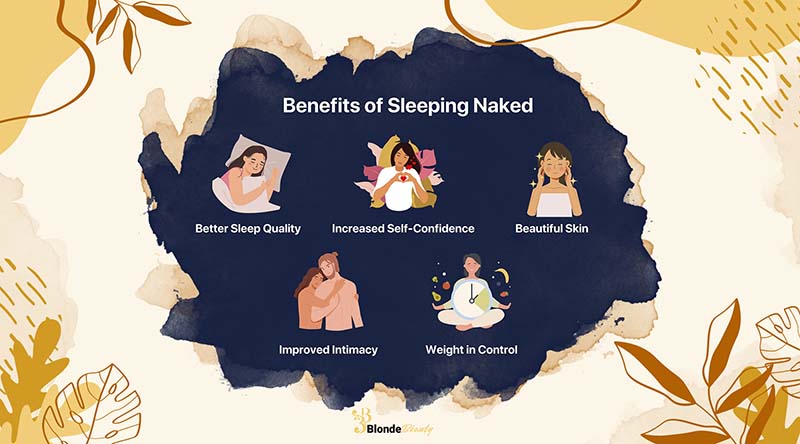Let’s talk about a topic that intrigues many: Does sleeping naked increase testosterone? This concern is part of a larger issue that affects many of us as we age: a decline in testosterone levels.
However, the interest extends beyond gym enthusiasts – testosterone plays a crucial role in numerous bodily functions for both men and women. It’s crucial to keep these levels healthy, and the good news is, you might not need complex treatments or supplements to achieve this.
A simple yet effective approach could involve ensuring you get enough quality sleep. Let’s explore how sleep and testosterone are linked, and whether sleeping without clothes could indeed help boost your testosterone levels.
You should also read the following articles:
- Are Bananas Bad for Testosterone? Myths & Benefits Unveiled!
- Does Saw Palmetto Increase Testosterone Levels? Is It Safe?
- Does Tight Underwear Affect Erectile Dysfunction? Insight
Does Sleeping Naked Increase Testosterone?
Several studies have explored the relationship between sleeping temperature and testosterone levels. For instance, one study observed fluctuations in testosterone levels throughout the seasons among men of various ages. Interestingly, testosterone levels peaked significantly in December, a colder month, suggesting a potential positive impact of cooler temperatures on hormone production.
Another study focused on rapid eye movement (REM) sleep and temperature, finding that heat exposure could influence sleep quality, particularly slow wave sleep (SWS) and REM sleep. Conversely, colder weather seemed to improve sleep quality. Additionally, research examining the correlation between testosterone levels and sleep quality highlighted a connection between low testosterone levels and poor sleep or sleep loss, further indicating the potential influence of temperature on hormone levels.
In contrast, a study published in the journal Fertility and Sterility explored how wearing tight or loose underwear affected testosterone levels in men. Participants self-reported the type of underwear they wore, and the study found that men who wore boxers reported higher sperm concentration and total counts compared to those wearing tight underwear, suggesting that tight underwear might impede spermatogenesis.
These findings underscore the importance of maintaining a cool bedroom temperature to optimize testosterone levels. While evidence suggests that sleeping naked or in cooler temperatures may be beneficial, further research is needed to determine the ideal sleeping temperature for maximizing testosterone production.

Other Benefits of Sleeping Naked
Sleeping in the buff might offer more perks beyond just potentially boosting testosterone levels. One major advantage is improved sleep quality. Without clothing, our bodies can better regulate temperature, promoting a more comfortable and restful sleep experience. This can lead to better mood, sharper cognition, and increased productivity during the day.
Moreover, going au naturel at bedtime can benefit skin health. When there’s no clothing to block airflow, the skin can breathe freely, reducing the risk of infections or irritation caused by tight clothing. Plus, sleeping without clothes can help control moisture levels in the body, cutting down on excess sweating and the growth of bacteria that thrive in warm, moist environments.
Additionally, ditching the PJs could spice up intimacy and enhance sexual satisfaction for couples. Skin-to-skin contact during sleep triggers the release of oxytocin, a hormone associated with bonding and feelings of closeness. This not only deepens the emotional connection between partners but also fosters a healthier and more fulfilling relationship overall.

The Relationship Between Testosterone and Sleep
The link between testosterone and sleep is fascinating. Normally, testosterone levels follow a natural pattern of rising and falling throughout the day, with peaks typically occurring around 8 a.m. and lows around 8 p.m. Sleep plays a crucial role in maintaining this rhythm of testosterone production.
Studies indicate that inadequate sleep or sleep disorders such as sleep apnea can disrupt testosterone levels. Conversely, irregularities in testosterone levels may also contribute to sleeping problems. This intricate relationship underscores the importance of both quality sleep and balanced hormone levels for overall health and well-being.
How to Increase Testosterone While Sleeping?
While sleeping naked may potentially boost testosterone levels, there are additional steps you can take to optimize hormone production during sleep. Here’s how to naturally increase testosterone levels while you snooze:
- Stick to a consistent sleep schedule: Maintaining regular sleep and wake times helps regulate hormone patterns, including testosterone production.
- Set up a sleep-friendly environment: Ensure your bedroom is conducive to restful sleep by keeping it quiet, dark, and comfortable.
- Limit exposure to artificial light before bedtime: Artificial light can disrupt melatonin production and disturb sleep quality. Minimize screen time and consider using blue light filters before hitting the hay.

- Stay physically active: Regular exercise has been shown to elevate testosterone levels. Incorporate physical activity into your daily routine to support hormone regulation.

- Manage stress effectively: Chronic stress can hinder hormone production, including testosterone. Practice stress-reducing activities like yoga, meditation, or deep breathing to keep stress levels in check.
Adopting these tips can boost not just testosterone levels but also your overall health and well-being. Incorporate them into your bedtime routine for optimal results.
Does Lack of Sleep Affect Testosterone Level?
There is indeed evidence suggesting that inadequate sleep can lead to decreased testosterone levels, although not all studies have consistently found the same results.
Sleep plays a significant role in regulating the daily rhythm of testosterone production, and disruptions in sleep patterns can interfere with this process. For instance, a study involving healthy young males found that sleeping less than five hours per night for a week resulted in a notable 10-15% decrease in testosterone levels.
Moreover, several studies have identified a correlation between obstructive sleep apnea (OSA) and low testosterone levels. However, it remains unclear whether OSA directly causes low testosterone or if there are other underlying factors at play. Nonetheless, there is some evidence suggesting that treating OSA may lead to an increase in testosterone levels.
Overall, while the relationship between sleep and testosterone is complex and ongoing research is needed, there is indication that insufficient sleep can indeed impact testosterone levels, underscoring the importance of prioritizing quality sleep for overall health and well-being.
Conclusion
In exploring the intriguing question, “Does Sleeping Naked Increase Testosterone?”, we find a positive connection. Sleeping naked can potentially boost testosterone levels by improving sleep quality through cooler temperatures, which research suggests enhances hormone regulation.
This simple lifestyle change not only offers a natural way to support hormonal health but also brings additional benefits such as better skin health, deeper intimacy, and overall well-being.
By incorporating this practice into your routine, alongside consistent sleep schedules, regular exercise, and effective stress management, you can embrace a holistic approach to health.
Visit other Blondebeauty articles to gain more health knowledge.

Laureate Professor Clare Collins
Professor Clare Collins is a leading expert in nutrition and dietetics at the School of Health Sciences, part of the College of Health, Medicine and Wellbeing. Her work is changing the way we think about food and health. She grew up as one of nine children and was the first in her family to finish high school and go to college. This background gave her a strong work ethic and a deep appreciation for seizing opportunities.
As the Director of the Hunter Medical Research Institute’s Food and Nutrition Program and a recipient of three NHMRC Research Fellowships, Professor Collins is making a big difference in public health. She focuses on helping people who are often overlooked, using new technologies like apps and online programs to improve their nutrition and reduce the risk of chronic diseases.
Professor Collins is well-respected and has been recognized as a Fellow in four major health and science organizations. She leads a diverse team of experts, including dietitians, computer scientists, and engineers, working together on global health projects.
Her achievements are impressive. She has received over $29 million in research funding, published more than 450 papers, and helped 35 PhD and Master’s students complete their degrees. She’s also active in sharing her knowledge with the public. She has developed tools like the Australian Eating Survey and the Healthy Eating Quiz, and she often appears in the media to talk about nutrition.
PUBLISHED ARTICLES
- Collins, C. (2019). “The Effect of a Pilot Dietary Intervention on Pain Outcomes in Patients Attending a Tertiary Pain Service.”
- Collins, C. (2022). “Variation in cardiovascular disease risk factors among older adults.”
- Collins, C. (2022). “Evaluation of an online intervention for improving stroke survivors’ health-related quality of life: A randomised controlled trial.”
These articles show Professor Collins’s commitment to understanding how better nutrition can improve health. Her work is important for researchers, doctors, and anyone interested in healthy living.
